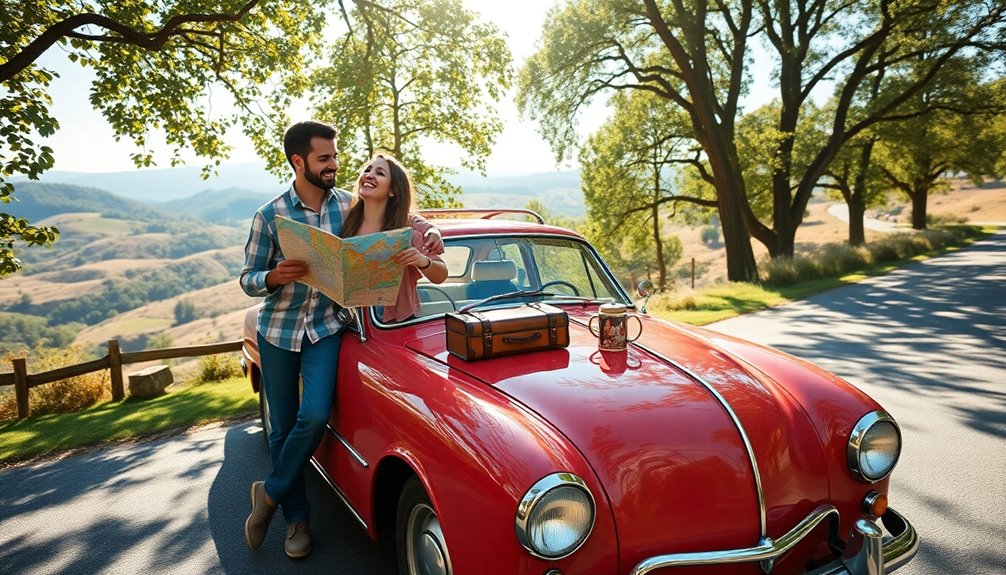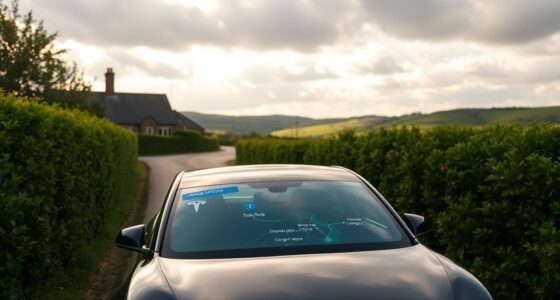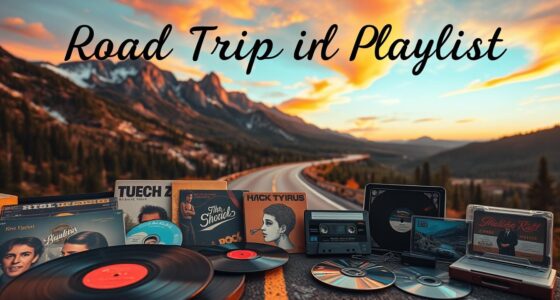Planning the perfect couple road trip starts with choosing a destination that excites both of you. Create a budget together, covering all the essentials like transportation and activities. Prepare your vehicle for the journey ahead, packing safety supplies and entertainment options like playlists and podcasts. Don’t forget to plan meaningful stops along the way to foster connection. With a bit of spontaneity and communication, your adventure can strengthen your bond. There’s so much more to explore! Consider incorporating unexpected detours to explore hidden gems, whether it’s a quaint diner or a scenic overlook. Research some unforgettable road trip ideas for couples that can include unique experiences like wine tastings or hiking in beautiful national parks. Ultimately, the journey is just as important as the destination, so embrace the moments you share along the way.
Key Takeaways
- Choose a destination with activities both partners enjoy and plan scenic routes to enhance the journey.
- Create a collaborative budget that includes all expenses and set daily spending limits for mindful spending.
- Prepare the vehicle by conducting a thorough inspection and packing essential supplies for a safe trip.
- Plan entertainment options such as playlists, podcasts, and games to keep the road trip lively and engaging.
- Document the adventure through a road trip logbook, photos, and a digital album to cherish memories together.
Choosing Your Destination and Route

When planning your couple road trip, how do you choose the perfect destination and route? Start by selecting a destination that has a mix of activities both you and your partner enjoy, like outdoor adventures or culinary experiences.
Next, map out your route using scenic highways or byways, which not only enhance the journey but also make the drive enjoyable. Research quirky roadside attractions, parks, and local eateries to break up long stretches of driving and add some spontaneity.
Utilize navigation apps like Google Maps or Waze to avoid traffic and find alternate routes.
Finally, maintain flexibility in your schedule to embrace spontaneous detours or unplanned stops, turning your trip into a collection of memorable experiences.
Creating a Collaborative Budget

After choosing your destination and plotting an exciting route, it's time to tackle the financial side of your road trip. Start by discussing your total budget, covering transportation, accommodation, food, activities, and emergency funds. This guarantees you're both on the same page.
Break down the budget into categories and allocate specific amounts based on past experiences to avoid overspending. Use budgeting apps or spreadsheets to track expenses in real-time, helping you stay accountable and make necessary adjustments.
Consider setting a daily spending limit to encourage mindful spending. Discuss sharing costs equally or proportionally, depending on each partner's financial situation, fostering fairness and transparency in your financial decisions. Additionally, it may be beneficial to establish an emergency fund to cover unexpected expenses during your trip.
Happy budgeting!
Preparing Your Vehicle for the Journey
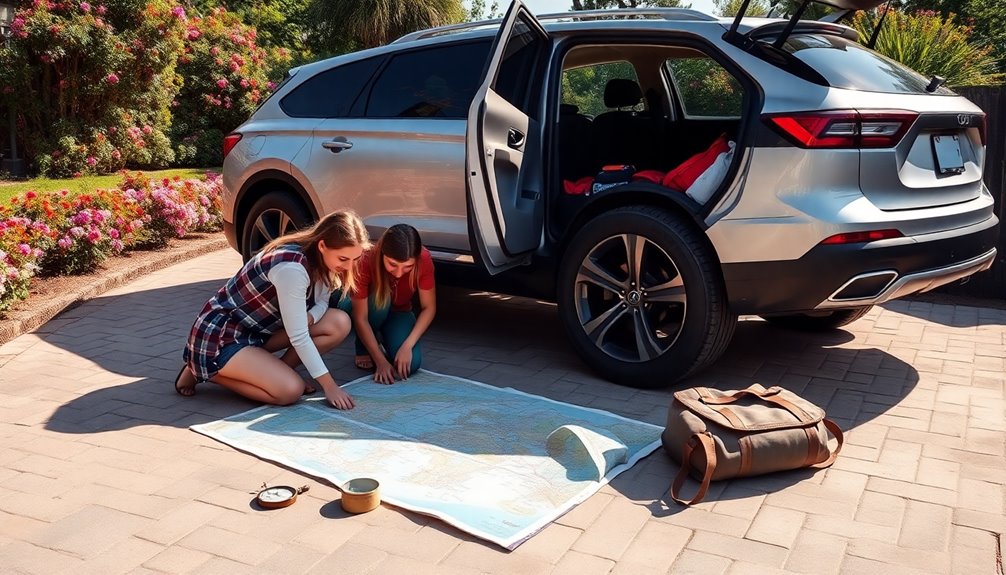
Before you hit the road, preparing your vehicle is essential to confirm a smooth and safe journey.
Start with a thorough vehicle inspection; check tire pressure, fluid levels, brakes, and lights to make sure everything's in prime condition.
Next, clean both the interior and exterior for enhanced comfort and visibility.
Don't forget to pack essential supplies like a first-aid kit, jumper cables, a flashlight, and a spare tire to handle any emergencies.
Make certain all necessary documentation—your driver's license, car registration, and insurance papers—are readily accessible.
Finally, verify that all electronic devices, including your GPS and phone chargers, are in working order. A cigarette lighter power inverter can help keep multiple devices charged on the go.
Packing the Essentials for Comfort and Safety
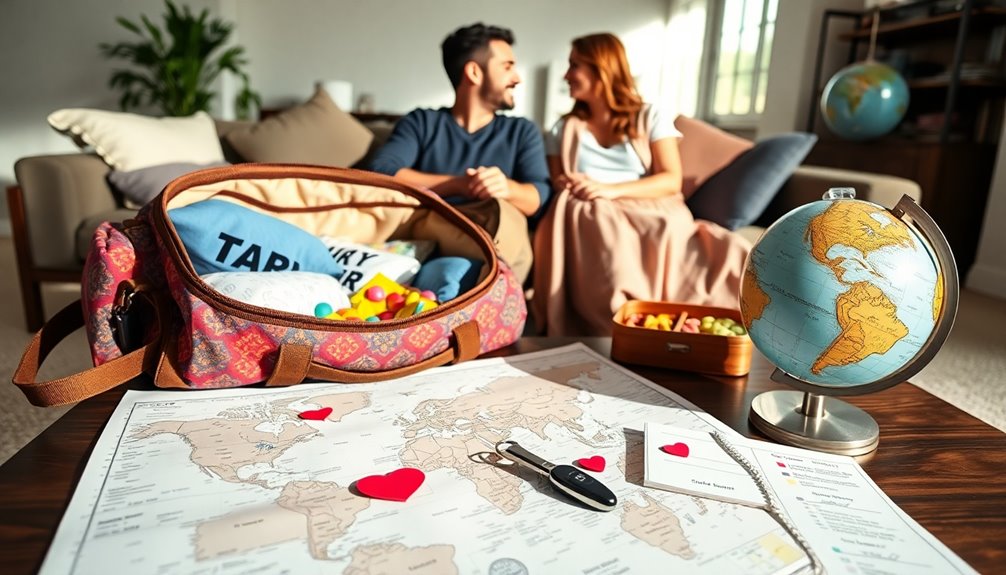
To guarantee a comfortable and safe road trip, packing the right essentials is essential. Start by including important documents like your driver's license, car registration, and insurance papers for compliance and peace of mind.
An emergency kit is important; make sure it contains a first-aid kit, jumper cables, a flashlight, and a spare tire for unexpected troubles.
Don't forget to bring comfortable clothing and bedding like blankets and pillows to keep things cozy during long stretches or overnight stays.
Pack a refillable water bottle and a variety of healthy snacks such as trail mix and granola bars to stay energized.
Finally, utilize offline maps and a cigarette lighter power inverter to keep your devices charged and stay on track, even in low-signal areas. Additionally, consider bringing an emergency kit that includes items like a flashlight and a first-aid kit, which can enhance your preparedness for any situation while traveling.
Entertainment Options for the Road
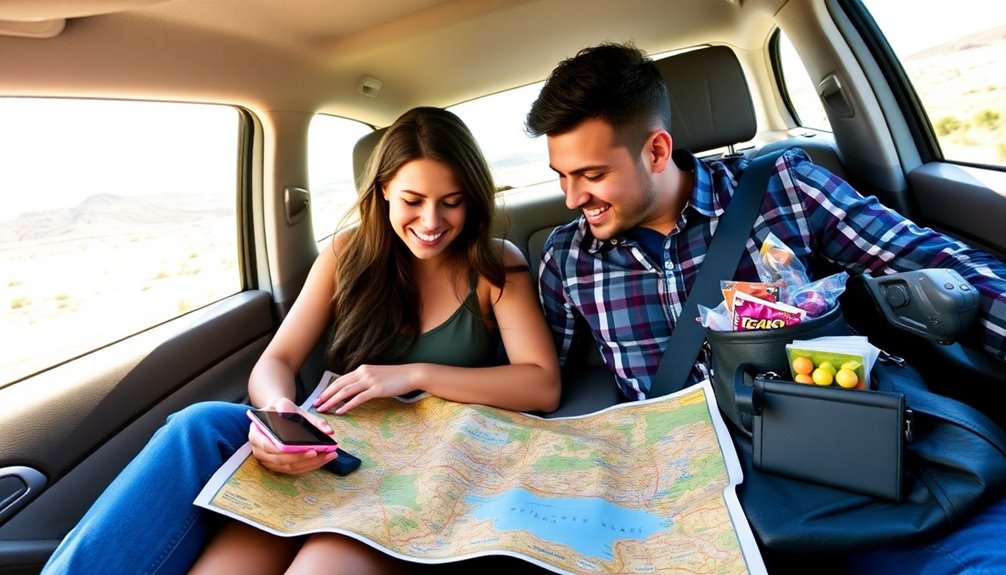
Once you've packed all the necessities for a comfortable and safe journey, it's time to think about how to keep the good vibes flowing on the road. Create a shared playlist on your favorite streaming platform, featuring each partner's favorite songs. Download engaging podcasts or audiobooks for thought-provoking discussions. Play classic car games like 20 Questions or Would You Rather, and don't forget to pack physical games like Mad Libs. Open communication about feelings and concerns is essential for a successful trip.
| Entertainment Options | Activity Type | Purpose |
|---|---|---|
| Shared Playlist | Music | Enjoyable musical experience |
| Podcasts | Audio | Thought-provoking discussions |
| Classic Car Games | Games | Light and fun atmosphere |
| Physical Trivia Cards | Games | Laughter and creativity |
Rotate DJ duties to keep things fresh!
Planning Meaningful Stops Along the Way

Meaningful stops can turn an ordinary road trip into an unforgettable adventure. When planning a road trip, use apps like Roadtrippers or Google Maps to discover quirky roadside attractions and scenic viewpoints.
Schedule pit stops every 2-3 hours to stretch, explore local cafes, and uncover unique shops in small towns. These breaks foster spontaneity and quality time together.
Incorporate cultural experiences by visiting museums or local festivals to deepen your understanding of the areas you travel through.
Don't forget nature stops at state parks or hiking trails to enjoy the scenic beauty and create shared memories.
Finally, research iconic local food spots, like diners or food trucks, to savor memorable meals that reflect the region's culinary culture—an essential part of your journey. Additionally, consider optimal times to cruise for inspiration on seasonal travel experiences that can enhance your road trip.
Fostering Communication and Connection

While commencing on a road trip together, fostering communication and connection can transform your journey into a more enriching experience.
Start by discussing potential challenges before you hit the road; it sets realistic expectations and cultivates a supportive environment. Use "I feel" statements during conversations to express emotions without placing blame, enhancing understanding between you.
Designate time for meaningful conversations during breaks, sharing dreams and aspirations to strengthen your emotional connection. Engage in fun road trip games like "Would You Rather?" to keep the atmosphere light while uncovering new layers of each other.
Finally, reflect on your shared experiences through journaling or a road trip logbook, reinforcing your bond and creating lasting memories of your adventure together.
Documenting Your Adventure Together

After strengthening your communication and connection, it's time to capture the memories made on your journey.
Start by keeping a dedicated road trip logbook to document daily experiences, noting places visited and your best memories.
Don't forget to snap photos at significant landmarks and spontaneous stops—both scenic views and candid moments will help create a rich photographic narrative of your trip.
Consider setting up a shared digital album or scrapbook afterward, allowing both of you to contribute.
Share highlights on social media to engage friends and family, deepening the enjoyment through shared stories.
Finally, schedule a post-trip discussion to reflect on your documented experiences, reinforcing your bond and inspiring future adventures together. Additionally, researching camping locations can provide inspiration for your next getaway.
Frequently Asked Questions
Are Road Trips Good for Couples?
Absolutely, road trips are great for couples! You get the chance to spend uninterrupted time together, which helps deepen your conversations and emotional connection.
Traveling opens doors to shared experiences and memories that can enhance your relationship. Plus, the spontaneity of the open road sparks adventure, allowing you to discover new places together.
Engaging in fun activities, like road games and music sharing, creates a lighthearted atmosphere that strengthens your bond.
What Is the 21 Questions Road Trip Game?
Did you know that couples who engage in deep conversations report feeling more connected?
The 21 Questions Road Trip Game is a fun way to strengthen your bond. You take turns asking thought-provoking questions, aiming to answer all 21 during your journey.
The questions can be light-hearted or introspective, allowing you to explore each other's thoughts and dreams. It's a great way to spark conversations that deepen your understanding of one another.
What to Do on a Road Trip With Your Boyfriend?
On a road trip with your boyfriend, you can make it memorable by engaging in fun activities.
Start by playing classic games like 20 Questions or Would You Rather to spark laughter.
Don't forget to create a shared playlist filled with your favorite songs.
Plan regular stops to explore quirky attractions and enjoy local eateries.
Keeping a mix of snacks handy will help maintain energy levels and keep the mood light and enjoyable.
How Many Miles Should I Drive a Day on a Road Trip?
When it comes to road trips, you don't want to bite off more than you can chew. Aiming for 300 to 600 miles a day is a good rule of thumb, depending on your comfort and destination.
Ideally, you should keep your driving time to about 6 to 8 hours, allowing breaks for meals and sightseeing.
Conclusion
As you hit the road together, remember that the journey is just as important as the destination. With each mile, you'll create memories that strengthen your bond and add to your story. So, what adventures await you around the next bend? Embrace the spontaneity, cherish the quiet moments, and celebrate the laughter along the way. By planning thoughtfully and staying connected, you're not just traveling—you're building a lifetime of shared experiences. Enjoy every moment!
